Vision
Delivering safe, integrated and environment-friendly transportation and mobility system that keeps pace with urban and population growths, improves social life, reinforces environmental sustainability, and supports economic growth to achieve national development requirements

Services












































Media center
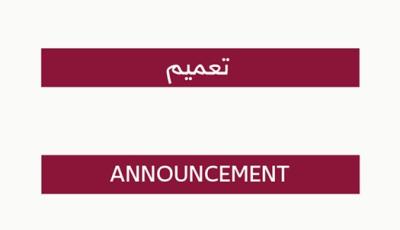
ANNOUNCEMENT
For the sake of public safety, the MOT calls on owners of maritime vessels, be them individuals or companies, to temporarily suspend maritime navigation, as part of several precautionary measures the State of Qatar is putting into effect against the background of recent developments in the region and as part of the MOT’s keenness on ensuring highest safety and security for all maritime trips.The MOT urges everyone to adhere to this announcement.The MOT continues following up and coordinating with all the bodies concerned regarding the latest developments and any new information will be announced once they become available.
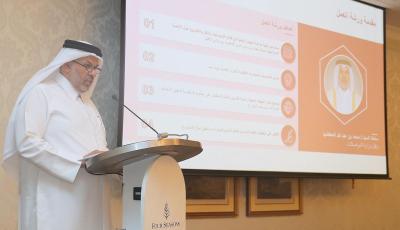
MOT Wraps Up Workshop on Hamad Port Competitiveness
A Ministry of Transport workshop focused on presenting the results and key recommendations of the project; “Study of the Competitive Position of Hamad Port” has concluded, in attendance of MOT Undersecretary H.E. Mohammed Abdullah Al-Maadeed.The workshop was attended by several bodies concerned, partners, and the project team from the MOT.Opening the event, H.E. Al-Maadeed said that Qatar has over the few past years progressed significantly in terms of developing its transportation infrastructure and invested heavily in establishing modern ports, airports and free and logistics zones, in addition to world-class road network; something that positioned the country among advanced economies when it comes to infrastructure readiness.And here comes the importance of developing our logistics industry as the major strategic pathway to translating that readiness to sustainable competitiveness, enhance the country’s position in global supply chain, and achieve real value added to support our national economy in the long term, he said.With that, Hamad Port emerges as the heart of the logistics industry in Qatar and the place where the national infrastructure ecosystem is fully operative, he said. When Hamad Port operates in full capacity, he explained, this doesn’t mean the operation of a single facility, but unlocking a whole network of roads, and free and logistics zones, and supply chains.Enhancing Hamad Port’s competitiveness, he added, isn’t an operational option, but strategic priority that enables the national infrastructure to fully support the economic growth and achieve the aspired impact.The workshop included a presentation on Hamad Port’s competitive position regionally and globally. It also presented key results, recommendations, and port competitiveness enhancement initiatives within the study, and implementation mechanisms.Additionally, the study touched upon cargo traffic growth obstacles, including procedural and cost-related challenges. It also presented practical recommendations and proposed measures to mitigate these barriers and enhance the port’s overall competitiveness.According to the study, the recommendations covered the following points and their execution through 24 initiatives: reducing costs, enhancing the port’s operational efficiency, introducing regulatory amendments to streamline the licensing structure across logistics industry’s activities, empowering the private sector, improving infrastructure, attracting investments and making them easy to carry out, and effective commercial communication.
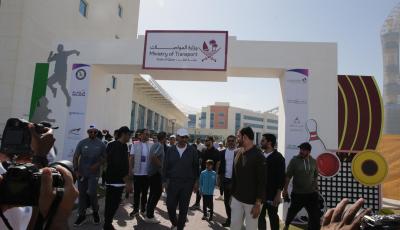
MOT, Transportation Entities Celebrate National Sport Day 2026
The Ministry of Transport and the transportation system entities of the State of Qatar marked National Sport Day 2026 today with a rich program of sporting and recreational activities for employees and their family members.The events were organized at Khalifa Sub-Stadium in Aspire Zone, in collaboration with the Qatar Civil Aviation Authority (QCAA), Qatar Rail, Qatar Aeronautical Academy (QAC), Mwani Qatar, the Hamad Port Project, Qatar Navigation (Milaha), QTerminals, and Mowasalat (Karwa).Minister of Transport H.E. Sheikh Mohammed bin Abdulla bin Mohammed Al Thani, along with a number of officials from the Ministry of Transport and transportation system entities, took part in the sporting activities.He added that the Ministry of Transport is keen to participate in National Sport Day alongside transportation system entities to raise awareness of the importance of physical activity and its role in community development and well-being, as well as to promote sport as an integral part of a healthy lifestyle for all segments of society.On this occasion, H.E. the Minister emphasized that celebrating National Sport Day annually reflects the importance of sport in the State of Qatar and embodies the leadership’s vision of sport as a fundamental pillar in building individuals and society. This vision has contributed to fostering a healthy culture within the community, in line with the goals of Qatar National Vision 2030.The program featured a variety of activities, including fitness exercises, walking, and recreational competitions suitable for all age groups, creating an atmosphere of enthusiasm, positivity, and high morale.H.E. Sheikh Jabor Bin Hamad Al-Thani, Director General of the Qatar Aeronautical Academy, stated that the Academy is pleased to celebrate National Sport Day of the State of Qatar, held this year under the theme “I Chose Sport.” He noted that the occasion highlights the importance of adopting a healthy and active lifestyle and reinforces the concept that practicing sport is a conscious personal choice that contributes to building a vibrant and healthy society.Capt. Abdulla Mohamed Al-Khanji, CEO of Mwani Qatar, emphasized that National Sport Day reflects the wise vision of Qatar’s leadership in building a healthy and dynamic society, which represents a cornerstone for achieving the objectives of Qatar National Vision 2030. He stated: “At Mwani Qatar, we believe that physical activity is not a temporary practice, but a strategic investment in human capital. A sound mind is the primary driver of creativity and professional excellence.”Mr. Mohamed Faleh Alhajri, in charge of managing the Qatar Civil Aviation Authority (QCAA), said that National Sport Day is one of the pioneering initiatives launched by the State of Qatar to promote a culture of sports participation and establish physical activity as a sustainable way of life. He explained that the initiative stems from Qatar National Vision 2030, which emphasizes investment in human capital as the foundation for building a strong and cohesive society.Mr. Fahad Saad Al-Qahtani, CEO of Milaha Group, stated that National Sport Day embodies the State of Qatar’s firm commitment to promoting human health and fostering a culture of healthy lifestyles across society. He added that Milaha’s partnership with the Ministry of Transport reaffirms their shared commitment to supporting sport as a way of life that positively impacts individual well-being and workplace productivity.Mr. Ahmad Hassan Al Obaidly, CEO of Mowasalat (Karwa), said: “At Mowasalat (Karwa), we reaffirm our commitment to supporting Qatar National Sport Day and strongly believe in the importance of promoting physical activity and healthy lifestyles within the community. Our participation reflects our national role in enhancing quality of life and aligns with Qatar National Vision 2030, which places human health and well-being at the core of its priorities.”Eng. Nabil Mohamed AlKhaldi, Executive Director of the Hamad Port Project, affirmed that the project’s participation in National Sport Day activities, under the umbrella of the Ministry of Transport, stems from a firm institutional belief that building sustainable communities begins with investing in people’s health and encouraging positive engagement among employees and their families.Group CEO of QTerminals, Mr. Marco Neelsen, said: “We are proud to sponsor the National Sport Day event organized by the Ministry of Transport. At QTerminals, we remain committed to supporting the communities in which we operate, and we view this initiative as an important opportunity to contribute to the goals of Qatar National Vision 2030, particularly in fostering a healthy, active, and engaged society. Our sponsorship reflects our ongoing dedication to promoting sport and overall well-being, and we encourage our employees to actively participate in the activities offered on this special day.”
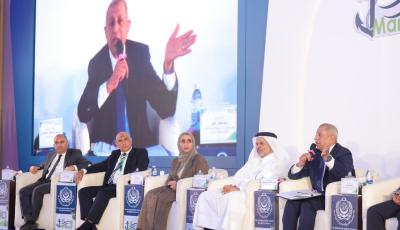
MOT Undersecretary Participates in 15th MARLOG Conf. in Egypt
The Undersecretary of the Ministry of Transport H.E. Mohammed Abdullah Al-Maadeed has headed the State of Qatar delegation to the 15th MARLOG Conference, which opened in Alexandria, Egypt, yesterday, under the patronage of the Secretary-General of the League of Arab States Dr. Ahmed Aboul Gheit and the Deputy Prime Minister for Industrial Development and Minister of Transport and Industry of the Arab Republic of Egypt H.E. Eng. Kamel El Wazir.Several transportation ministers and maritime transportation experts were also in attendance.Participating in a high-level panel discussion, H.E. Al-Maadeed highlighted the main features of the development of ports and logistics ecosystem in Qatar, noting that Qatar has adopted a proactive approach in developing it, based on long-term planning, integration between infrastructure and regulatory policies, and the use of modern technology.He said Qatar has invested in developing the infrastructure projects for that critical industry to develop remarkably in all fronts, particularly commercial and tourist ports and assistive logistics services.Hamad Port, he said, has been a pivotal turning point in this respect, in terms of reshaping the supply chains and enhancing the country's ability to react efficiently and flexibly with global changes. The advanced infrastructure and modern, ecofriendly technology of Hamad Port have contributed to transforming it into a regional hub port for re-exportation and transshipment, hitting advanced rankings on the Container Port Performance Index, issued by the WB – the first in the Gulf region and 11th globally, in the CPPI report 2024.He said that in parallel with developing the ports, Qatar has been keen to build an integrated logistics system that extends from the ports to the logistics zones and free zones, in order to ensure smooth movement of goods, raise the efficiency of operations, and reduce operating costs.That was backed by rolling out digital solutions, updating clearance procedures, and activating the concept of smart ports and logistics hubs.And as part of supporting national development requirements, and to promote economic diversification and environmentally sustainable solutions in line with QNV 2030, he said, the MOT has developed a national strategy for logistics services sector and launched a masterplan for ground freight in Qatar, aimed at contributing to enhancing integration between the sea, air, and ground freight industries, thus supporting supply chains and competitive advantages of regional and international trade through connecting companies, products, services and individuals together, and enabling traders and investors to trade at the lowest cost and the shortest time.This, he noted, can help satisfy the requirements for economic diversification clusters for both logistics services and shipping, and enhance Qatar’s position as a hub for shipping, transportation and logistics services with the top 15 countries in the world in the logistics efficiency index.“We do not look at this system as separate projects, rather as an integrated ecosystem based on the interconnection of multiple modes of transportation, institutional coordination, partnerships with the private sector, and regional and international integration. This has enabled the State of Qatar to strengthen its position as a reliable logistics hub, capable of serving the region and connecting it to global markets efficiently and sustainably.”He added that Qatar is committed to continuing developing its ports and logistics services industries, not only through investing in infrastructure, but also through policy development, promoting innovation, and expanding regional and international cooperation, in order to keep pace with global changes and serve the goals of comprehensive development.The theme for this year's event is "Smart & Resilient Logistics Corridors – Future Gateway to the Green Trade." The focus will be on innovative approaches for sustainable, digital, and resilient supply chains, as well as the role of smart logistics corridors in a changing global economy.
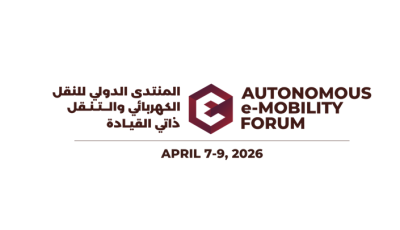
MOT to Host 2nd Autonomous e-Mobility Forum in April
The Ministry of Transport is hosting the 2nd edition of the Autonomous e-Mobility Forum this April 7-9, at the Qatar National Convention Center (QNCC).Organized by Just us & Otto Marketing Services, the 2026 Forum will highlight some of the latest trends and innovations in sustainable transportation. It serves as a unique platform for the exchange of expertise and insights, as well as discussions on the future of e-mobility and the latest developments in the industry.This 2nd edition of the Forum will assemble numerous local, regional, and international speakers, including senior government officials, industry experts, innovators, academia, and community individuals.Key TopicsThe 3-day Forum will examine major industry topics, including:Electrification of vehicle fleets and logistics networks and its impact on transportation and daily life in the regionThe role of autonomous systems in smart citiesDevelopment of digital infrastructureAI-based traffic managementThe importance of strong policy frameworks and incentives for secure adoption and implementationPotential for local innovation and cultivation of homegrown mobility ecosystemsSupport & SponsorshipThe event has garnered support and sponsorship from multiple industry leaders and esteemed institutions, including:Qatar RailQTerminalsMwani QatarQatar Free Zones AuthorityCheryAl Abdulghani MotorsSeib InsuranceOther strategic partners committed to a sustainable futureStrategic AlignmentThe Forum’s second edition underpins the recently launched Ministry of Transport Strategy 2025-2030, aligned with the Qatar National Vision 2030. The Strategy aims to establish a secure, integrated, and sustainable transportation system powered by innovation, clean energy, and smart technologies. The event reflects MOT’s ongoing efforts to advance next-generation mobility solutions that support national priorities and address global sustainability concerns.Private Sector & Community EngagementDesigned as an immersive and collaborative experience, the Autonomous e-Mobility Forum goes beyond traditional presentations. Participants can:Engage directly with global experts and regional policymakers through keynote sessions and panel discussionsExplore a dedicated exhibition space showcasing EVs, charging infrastructure, and smart mobility devicesParticipate in workshops, networking sessions, and community engagement opportunities to facilitate awareness, meaningful dialogue, and partnershipsTo learn more, please visit: www.aemobforum.com
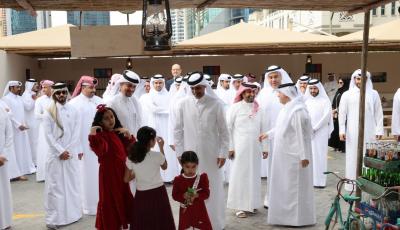
MOT Celebrates QND 2025
The Ministry of Transport today celebrated the Qatar National Day 2025 with a special event attended by Minister of Transport H.E. Sheikh Mohammed bin Abdulla bin Mohammed Al Thani, heads of transportation industry’s entities, and Ministry employees.The event, held in front of the façade of the Ministry’s headquarters, featured several activities that reflected part of the rich Qatari identity and cultural heritage.
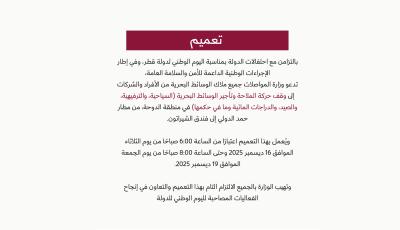
MOT Announcement – December 2025
Considering Qatar National Day celebrations, and as part of national measures to support public safety and security, the Ministry of Transport calls upon maritime vessel owners, be they individuals or companies, to suspend maritime navigation as well as maritime vessel leasing (pleasure crafts, tourism, fishing, scooters, and the like) in the Doha area, specifically from Hamad International Airport to Sheraton Doha Hotel.This circular takes effect from 06:00 a.m. on Tuesday, December 16, through 08:00 a.m. on Friday, December 19, 2025.The Ministry urges all to abide by this circular and cooperate for the success of QND events.
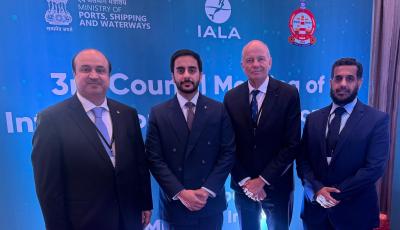
MOT Attends IALA Council Meeting in Mumbai
The MOT, with a team headed by Asst. Undersecretary of Maritime Transport Affairs Eng. Abdulaziz Abdulla Al-Sulaiti, has taken part in the 3rd IALA Council Meeting in Mumbai, India.Key topics discussed included developing NAVAIDs, advancing digital transformation of navigation services, exchanging navigation data, and harnessing advanced technologies.It also discussed the areas associated with training programs and capacity building aimed at boosting navigation’s safety and efficiency at the national and global levels.
Transportation Master Plan for Qatar-2050
This Plan works as a roadmap for investing in land transportation infrastructure and identifies the frameworks and future orientations for developing the transportation networks.
Read more
